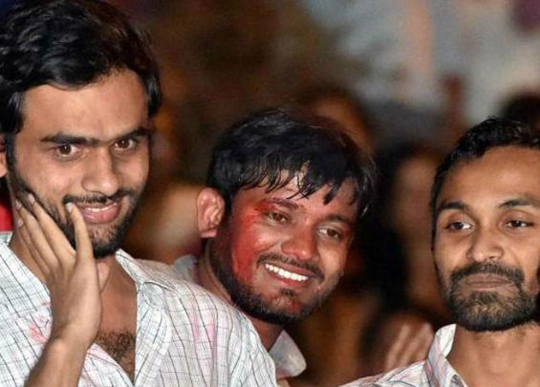New Delhi, Mar 19: Hours after his release from Tihar jail in a sedition case, JNU student Umar Khalid today said he has no regrets of being jailed and was rather proud of being booked under the said charges.

"We have no regrets of being jailed in this particular case. We are in fact proud of the fact that we have been booked under sedition, a law under which activists like Arundhati Roy and Binayak Sen were booked.
"Our names have been added to the list of those who have been jailed for raising their voices," he told a gathering at the varsity.
In a 35-minute speech, Umar said, "I am not ashamed that I was in jail. Criminals are those who are in power, those in jail are the ones who raise their voice."
"I also don't think that freedom of expression is in danger. It only belongs to those in power. People like (Pravin) Togadia and Yogi Adityanath have all the freedom of expression," he said.
Umar claimed that he was being labelled a terrorist because of Islam, which, he said, he did not practice.
"I never followed Islam but I was called Islamist terrorist. It was not just my trial but entire Muslim community's trial. But I want to ask what if I was practising Muslim? What if I came from Azamgarh and wore a skull cap? That will be enough to give me a terrorist certificate", he said.
Khalid, who was welcomed at the gathering by JNUSU president Kanhaiya Kumar and his 6-year-old sister Sara, said, "Those who are raising concerns about wastage of taxpayers' money, we want to tell them we are not going to go back to studies now that we are back from jail. By jailing us you have given bigger responsibilities on our shoulders and we will fulfill that by fighting."
Umar, and Anirban Bhattacharya, arrested last month on charges of sedition for their involvement in a controversial event organised to protest hanging of Afzal Guru, were today granted interim bail for six months by a Delhi court on ground of parity with Kanhaiya.
Kanhaiya, who was also arrested on charges of sedition in connection with the February 9 event at the JNU, was granted bail earlier this month.
"I was linked with Jaish-e-Mohammad, I was accused of eloping to Kashmir or Pakistan while I was sitting at the university administration block, I was declared a traitor to the nation by virtue of birth.
"We are still in a better position as we were not killed in an encounter or tortured in custody and our houses were not burnt. Usually that's the fate of those who raise their voices," Khalid said.
"We do condemn 'bharat ki barbadi' (India will be destroyed) slogans but our slogan is 'Sangh ki barbadi tak jung rahegi' (fight till sangh is destroyed). There can't be peace without justice and where there is RSS can't be justice," he said.
Amid shouting of 'aazaadi' slogans, Anirban recalled his experiences in jail and how authorities were more appalled at him being an "anti-national".
"They said Khalid sahab to we understand, but you being a Bhattacharya how can you be anti-national? I had no answers and I am still clueless about what transpired in the last one month," he said.
"I did not feel bad about being in jail but the day Kanhaiya came back to campus I missed being here," he said.





Comments
Lo rikaacha ...good joke kano...chaddi galu scared abthe ..haha...worlds most deadliest crimes rapes beheadings are done by muslims...99.999% muslims are terrorists. . take out the statistics .. First of all saabi galige nidde barallo mama Israel and modi hesru kelidre ...haha ...
Mr. Umar If you never followed ISLAM!! then, you are unfit to named as Umar Khalid... and raise voice against discrimination. Let media and politician call you as either Islamic Terrorist or fundamentalist it is not a big thing. Because Allah knows the best what and who are you..but be firm in your religion and fight for freedom IN India..
cheddies are scared of muslims name....not whether you follow muslim or not...even in the night they cannot get proper sleep just because of muslim names....you dont have to harm them but they scared it is automatic...its from Allah the alimighty....Subhan Allah!
NO NEED TO FOLLOW ISLAM ... IF U R MUSLIM U R TERROR AS PER THEM...
Add new comment